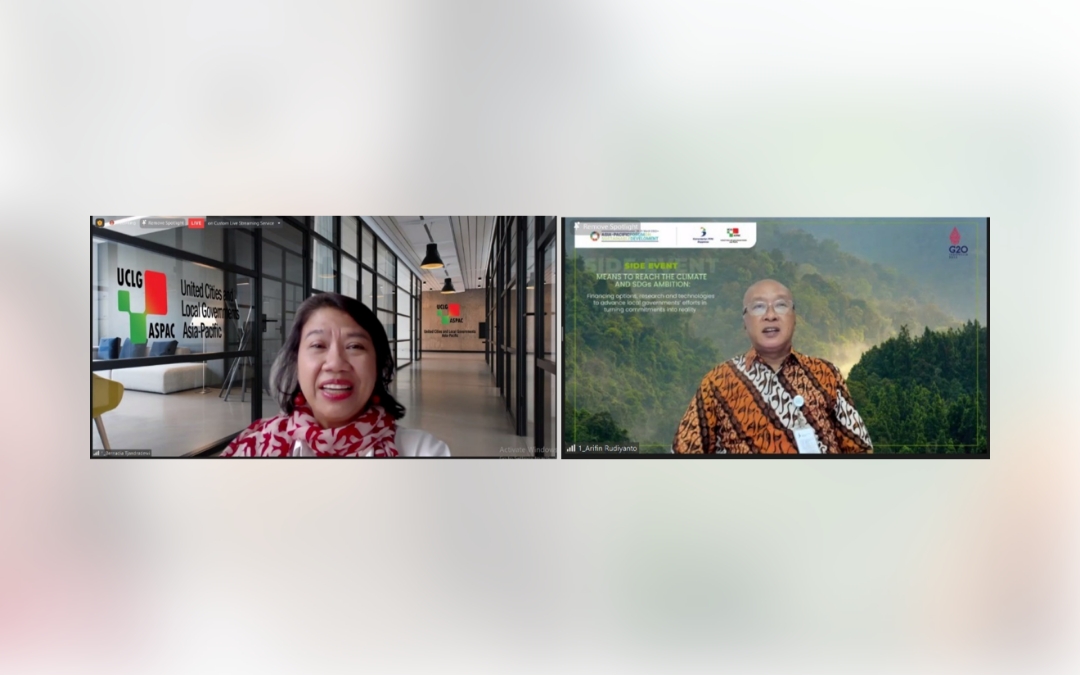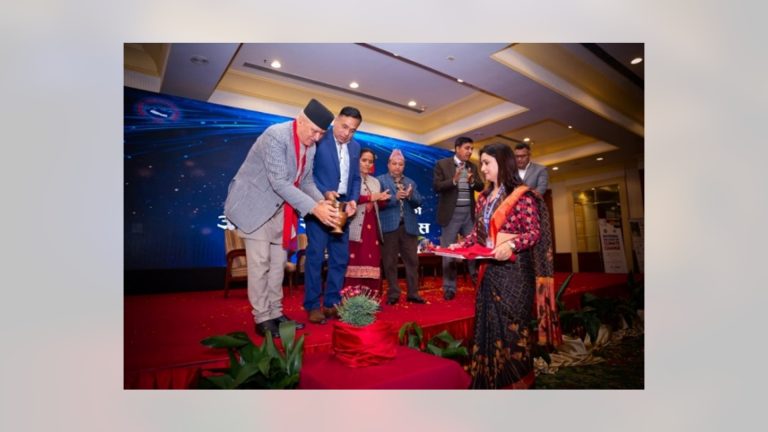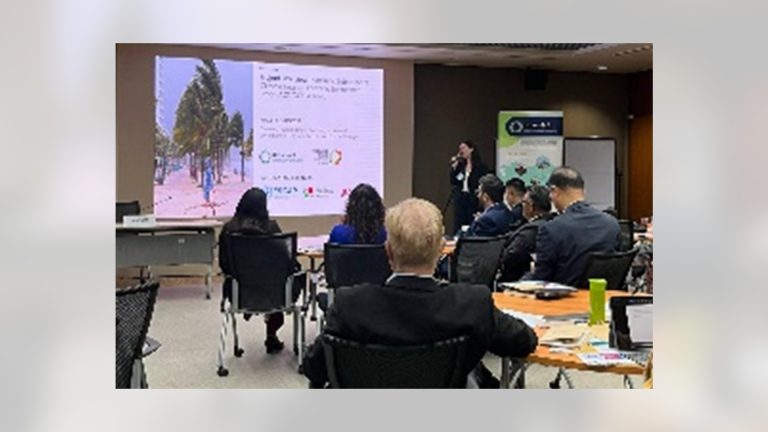28 March 2022 | UCLG ASPAC, in close collaboration with the Ministry of National Development Planning of Indonesia, and its global partners (Asian Development Bank/ADB and UN ESCAP) contributed to the Asia-Pacific Forum on Sustainable Development 2022 through the renewal of local governments’ commitment, showcase of practices, and knowledge sharing. The Report of the 9th APFSD will serve as the region’s input to the High-Level Political Forum to be held in July 2022.
UCLG ASPAC – Ministry of National Development Planning of Indonesia
In close collaboration with the Ministry, UCLG ASPAC, under its major climate programmes, the Global Covenant of Mayors (GCoM) Asia and Climate Resilient and Inclusive Cities (CRIC), UCLG ASPAC shared the knowledge and presented showcase of cities in side event discussing “Means to Reach the Climate and SDGs Ambition: Financing Options, Research, and Technologies to Advancing Local Governments in Turning Commitments into Reality.”
Commencing the event was Dr. Arifin Rudiyanto, the Acting Deputy Minister for Maritime and Natural Resources of Indonesia, National Development Planning Agency (Bappenas), highlighted that Indonesia has mainstreamed the SDGs in the National Medium-Term Development Plan (RPJMN) 2020-2024 document. Dr. Arifin said, “Indonesian government commits to strengthening the low carbon development and climate resilience as a national priority programme.” As Indonesia holds the G20 presidency this year, he also mentioned that Indonesia would emphasise the commitments of all countries to finance the global emission reduction projects for a better world.
At the event, the GCoM SEA Secretariat shared more details of two PPFs brought by GCoM partners namely City Climate Finance Gap Fund (or Gap Fund) and Transformative Action Programme (TAP) and provided information on successful cities and local governments getting financed by Gap Fund and cities and local governments applying TAP. UCLG ASPAC also used the event to promote the GCoM as the global alliance of cities and local governments working to achieve a climate-resilient future.
Mayor Ibnu Sina of Banjarmasin representing the UCLG ASPAC CRIC Programme shared the city’s strategy to become climate resilient. Efforts taken include integrating GHG Reduction action plan, improvement of waste management, as well as water and sanitation. Car-free day, plastic reduction, river revitalisation, and organising community movement and competition have also been applied. Mayor Ibnu Sina shared that Banjarmasin has been partnering with non-governmental institutions for funding and aims to become a city of collaboration. On this occasion, he invited all parties with the same vision to collaborate and make Banjarmasin a resilient and adaptive city.
Prof. Wiwandari Handayani (University of Diponegoro) shared Semarang City’s experience in financing urban climate resilience. Semarang has come a long way from business as usual to transformative adaptation, which includes making some bankable interventions and collaborating for more proactive climate solutions. As of now, Semarang has received various support from the national government and international institutions for programme and project implementation.
The event also had a panel discussion bringing up the topic “Local Governments as Climate Champions: Best Practices from Thailand, Malaysia, and Indonesia.” Speaking on behalf of Hat Yai (Thailand), Assoc. Prof. Dr. Wichai Kanchanasuwan mentioned that Hat Yai is moving towards a green city, low-carbon city, disaster-resilient city, and smart city by 2030. He also shared the city’s 2019 greenhouse gas inventory in three sectors, namely stationary energy, transportation, and waste. Finally, he also highlighted the importance of establishing and maintaining collaboration with other agencies, such as international organisations, non-governmental organisations, and universities.
Representing Kuala Lumpur was the city Mayor, Datuk Seri Mahadi bin Che Ngah. Mayor Mahadi stated that, as the capital city, Kuala Lumpur fully supports Malaysia’s commitment to be a carbon-neutral country by 2050. Through its vision, “Creating a sustainable, liveable, resilient, safe, inclusive, and a happy city for all,” Kuala Lumpur has incorporated and aligned action plans with the SDGs. While some challenges remain, the city has actively taken some meaningful approaches, like community buy-in programmes and amendments to local by-laws. He concluded his presentation with a powerful tone, “I would like to emphasise that we are firm in our commitment to mitigate climate change for the sustainability of Kuala Lumpur.”
Indonesia was represented by two cities: Jakarta and Samarinda. Mr. Nasruddin Djoko Surjono, the Head of Planning dan Development Agency of Jakarta Provincial Government, explained that Jakarta’s position as the centre of government and economy in Indonesia as well as the biggest metropolitan in Southeast Asia has made Jakarta prone to climate change impacts. Therefore, the capital city has established a set of strategies and made some efforts in response to climate change. One of the noticeable efforts in the transportation and mobility sector is Jakarta won the Sustainable Transportation Award in 2021.
Concluding the event were closing remarks by UCLG ASPAC Secretary-General Dr. Bernadia Irawati Tjandradewi. She highlighted the importance of creating an enabling environment and building capacities for long-term implementation and helping secure integrated and sustainable financing to implement climate actions.
UCLG ASPAC – ADB and UN ESCAP
UCLG ASPAC also collaborated with UN ESCAP and the Asian Development Bank (ADB) in organising a side event “Bridging the Gap: Experience of Subnational Governments in Reporting and Monitoring SDGs Achievement”.
The session shared the experiences of the Associations for Development of Local Governments in Pakistan (ADLG) and the League of Cities of the Philippines (LCP) in developing the Voluntary Subnational Review (VSR), Surabaya City, DKI Jakarta, and Urbanice Malaysia in developing the Voluntary Local Review (VLR).
The overall event was concluded with a summary and closing message from the Chief of Sustainable Urban Development Section, Environment and Development Division of UN ESCAP, Mr. Curt Garrigan. He highlighted the integration of VLR and VSR in localising SDGs would help to create more robust reporting toward the 2030 agenda. Despite all the challenges, he hopes the process of recognising continuous effort will increase coordination between local and national governments in achieving SDGs.
| UCLG ASPAC serves as coordinator of the Asia-Pacific Local Government Coordinating Body (APLG) which facilitated the preparation of the joint statement and participation of local governments at the APFSD. During the Forum’s agenda on the review of regional progress on SDGs, UCLG ASPAC Secretary General Dr. Bernadia Irawati Tjandradewi delivered the joint statement of local governments. “Local governments are not just arms that implement that 2030 Agenda. Local governments are at the very heart of its implementation and the recovery from COVID-19.” She underscored the pivotal role of local governments and called for support by providing access to financing mechanisms and capacity development and exploring mechanisms to institutionalise synergies between the Voluntary National Review (VNR), VSR, and VLR.
The Asia-Pacific SDG Partnership Report 2022 “Building Forward Together: Towards an Inclusive and Resilient Asia and the Pacific” was launched during the APFSD. Prior to this, UNESCAP virtually launched the Asia and the Pacific SDG Progress Report 2022 which indicated that progress on the SDGs’ achievement has been insufficient and has slowed down, moving the expected year of achievement to 2065. |











